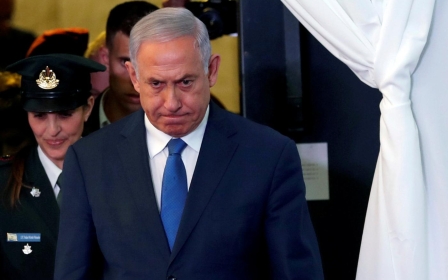Parliamentary panel on Netanyahu immunity request may convene as soon as Monday

A parliamentary committee to discuss granting Israeli Prime Minister Benjamin Netanyahu's request for immunity in the three corruption cases against him may convene as soon as Monday, following an opinion issued by a legal adviser, Haaretz reported.
Netanyahu’s immunity request had been expected to delay his court appearance until after 2 March elections. Still, his opponents have sought to kick-start the process and deny the premier immunity before polls by getting approval to form the necessary parliamentary committees, AFP said.
Eyal Yinon, the parliament’s legal adviser, issued an opinion on Sunday saying that Speaker Yuli Edelstein cannot veto the convening of the committee.
Most lawmakers are expected to vote against granting immunity to Netanyahu, who has been indicted for bribery, fraud and breach of trust.
Blue and White leader Benny Gantz said he had told party colleague Avi Nissenkorn, who chairs the organising committee, to convene as soon as possible to discuss the immunity request.
The legal opinion followed a request to launch the process by parties representing 65 lawmakers - a majority of the 120 parliament members - in favour of denying Netanyahu immunity.
Yinon’s opinion said he had determined that Edelstein cannot prevent a meeting of the panel that organises the establishment of the various committees.
Still, Edelstein, a member of Netanyahu’s Likud party, said he disagreed with Yinon’s opinion and that he would not help make parliament “the site of cheap election propaganda”. Edelstein added that he could not promise that a fair process, claiming that there was a “conflict of interest” in the proceedings.
Edelstein had sought to block the committees being formed and requested the legal opinion on whether he had the authority to do so.
Netanyahu denies the corruption allegations and accuses prosecutors and the media of a witch hunt.
Under Israeli law, a sitting prime minister is only required to step down once convicted of an offence and after all avenues of appeal have been exhausted.
Likud and Blue and White were deadlocked in April and September elections, prompting a third national poll within a year.
Middle East Eye delivers independent and unrivalled coverage and analysis of the Middle East, North Africa and beyond. To learn more about republishing this content and the associated fees, please fill out this form. More about MEE can be found here.





